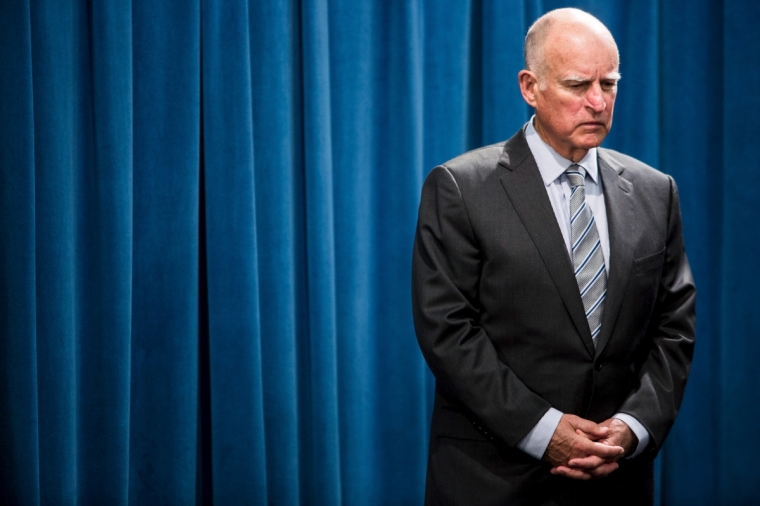Polls: Americans lining up behind 'right to die'

SACRAMENTO (Christian Examiner) – Just as the gay rights juggernaut turned America toward same-sex marriage state by state, a new movement to allow Americans who are terminally ill to take their own lives with the help of a physician is also gaining momentum.
In the end, I was left to reflect on what I would want in the face of my own death," the governor wrote. "I do not know what I would do if I were dying in prolonged and excruciating pain. I am certain, however, that it would be a comfort to be able to consider the options afforded by this bill. And I wouldn't deny that right to others.
On Oct. 5, the "Right to Die Movement" chalked up another victory in California as Gov. Jerry Brown signed into law a bill allowing terminally-ill patients to request their own date of death. The bill struggled through the legislature and was not handled until the governor – who claims to be Roman Catholic – called a special session to deal with it.
Gov. Brown issued a signing statement with the bill, addressed to the members of the state assembly. In it, he said the question addressed by the bill was whether or not the State of California should continue to call the suicide of a dying person a crime.
"I have carefully read the thoughtful opposition materials presented by a number of doctors, religious leaders and those who champion disability rights. I have considered the theological and religious perspectives that any deliberate shortening of one's life is sinful," Brown wrote.
"In the end, I was left to reflect on what I would want in the face of my own death," the governor wrote. "I do not know what I would do if I were dying in prolonged and excruciating pain. I am certain, however, that it would be a comfort to be able to consider the options afforded by this bill. And I wouldn't deny that right to others."
Brown's sentiments, if heartfelt, are in line with those of an ever-increasing number of Americans, according to both Gallup and the Pew Research Center.
According to Gallup, which published the findings of its survey on physician-assisted suicide in May, 68 percent of Americans now support euthanasia, even when the word "suicide" – with all of its negative connotations – is used. That figure is up a full 10 percentage points from the previous year and 16 percentage points from when Gallup began measuring the data in 1996. Assisted suicide was, however, also viewed in an equally positive light in 2001.
A key data point of the study from Gallup included a finding that support for euthanasia was higher as the age of the respondents decreased. Millennials, or those ages 18-34, said by a large margin (81 percent) that physician-assisted suicide should be allowed. That number fell to 65 percent for people aged 35-54, and to 61 percent for those 55 and older.
According to the poll, 56 of Americans now believe suicide with the assistance of a doctor is acceptable. In 2013, less than half of Americans said such actions were moral (45 percent).
The Pew study was more detailed, centering its questions on the connection between views of morality and the medical condition of a patient in question. In instances where a patient was in "great pain" with "no hope of improvement," or suffering from an incurable disease, support for physician-assisted suicide was much higher than if the patient or family members believed the dying person was a burden to his family.
California now joins three other states which have enacted laws allowing for physician-assisted suicide. Those include Vermont, Washington and Oregon. Judges in Montana and New Mexico recently affirmed the "right to die" in court cases also.
The push to adopt the legislation in California was largely the result of the efforts of Brittany Maynard, who moved to Oregon to take advantage of the state's physician-assisted suicide law. Maynard, popularized as a cause celebre for end-of-life decision making, or "death with dignity," died when her doctor helped her take a lethal cocktail of drugs in November 2014. She had terminal brain cancer.
Maynard's family and friends pushed for the legislation in California. The Catholic Church, however, strongly opposed it.
A Harris Interactive Poll, taken in 2014 while Maynard was actively campaigning for the "right to die" claimed 74 percent of American adults believed terminally-ill patients should be able to end their lives if in great pain.
"Public opinion on these issues seems to be far ahead of political leadership and legislative actions," Humphrey Taylor, chairman of The Harris Poll, said in December 2014. "Only a few states have legalized physician-assisted suicide and none have legalized physician-administered euthanasia."
According to Death with Dignity, a national advocacy group for physician-assisted suicide, efforts are currently underway in 29 other states to pass legislation for the practice.
RELATED STORIES:
Rick Warren & Joni Eareckson Tada weigh in on California's newest assisted suicide bill